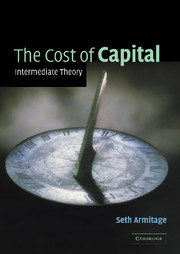Book contents
- Frontmatter
- Contents
- List of figures
- List of tables
- Preface
- Part I Expected Returns on Financial Assets
- Part II A Project's Cost of Capital
- 6 Project valuation
- 7 Corporation tax, leverage and the weighted average cost of capital
- 8 Personal tax and the cost of equity: the old and the new views
- 9 Personal tax, leverage and multiple tax rates
- 10 Inflation and risk premiums
- 11 The international dimension
- Part III Estimating the Cost of Capital
- References
- Index
8 - Personal tax and the cost of equity: the old and the new views
Published online by Cambridge University Press: 05 June 2012
- Frontmatter
- Contents
- List of figures
- List of tables
- Preface
- Part I Expected Returns on Financial Assets
- Part II A Project's Cost of Capital
- 6 Project valuation
- 7 Corporation tax, leverage and the weighted average cost of capital
- 8 Personal tax and the cost of equity: the old and the new views
- 9 Personal tax, leverage and multiple tax rates
- 10 Inflation and risk premiums
- 11 The international dimension
- Part III Estimating the Cost of Capital
- References
- Index
Summary
Personal taxes do not appear either in conventional formulas for the cost of equity, such as the standard CAPM, or in the formulas for a project's cost of capital discussed in the last chapter. It is tempting to infer from this that personal taxes have no impact on the cost of capital, but such an inference is not warranted, at least not a priori. Personal taxes affect the cash flows that providers of capital receive from projects, and project cash flows are always measured before personal tax. Therefore, the cost of capital is always expressed before personal tax, and personal taxes affect the cost of capital.
Personal taxes are levied on the pay-offs from financial assets. The pay-offs are received by investors whose tax circumstances vary. This means that there is no single, market-wide rate of personal tax that applies to any particular financial asset, and there is no single after-tax rate of return on the asset. Given the market price and the future returns on the asset before personal tax, there are as many after-tax rates of return as the number of different personal tax rates facing the holders of the asset. This is probably the main reason why the cost of capital is never expressed after personal tax. The serious complication that there is no single rate of personal tax paid by all the holders of an asset is often ignored in analyses of the effect of personal tax on the cost of capital, and it is ignored in the current chapter.
- Type
- Chapter
- Information
- The Cost of CapitalIntermediate Theory, pp. 181 - 204Publisher: Cambridge University PressPrint publication year: 2005



